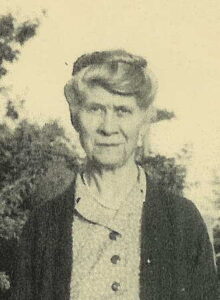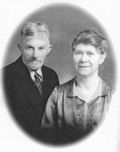MY MATERNAL GRANDMOTHER MARIJA BABAROVICH 1863 – 1953
On August 8, 1953 my maternal grandmother, Marija Babarovich died in Anacortes, Washington at age 90. That was the year I graduated from high school at Anacortes. She was born September 21, 1863 in Splitska, Brac, Croatia. She died on August 8, 1953. She was a woman of great courage, faith and personal sacrifice. Her husband, my grandfather, Peter, had died the year I was was born in Anacortes and I never knew him. She never remarried. 
I remember her vividly. A tall, erect woman with hair piled high on her head, she looked regal. She could speak almost no English and neither of my two sisters or I could speak the Yugoslavian language or, for that matter, the Italian language of our father’s parents – all of whom were immigrants. That’s because dad, as an immigrant, believed we should speak English at home n order to be a success in America. As a result, our communication with both sets of grandparents was largely through interpretation by our parents – and by non verbal communication of gestures plus wonderful food they both cooked. Nonna Babarovich was a religious woman who frequented the nearby Catholic church and who had a rosary handy most of the time. She was gentle and kind. She radiated a quality of dignity. What I do clearly remember was she had a habit of saying to me in broken English, after we visited her and were leaving: “Now you be a good boy,” advice I should have taken more to heart in my youth.
This immigrant story starts with my grandfather Peter Babarovich and his two brothers John & Spiro who were living in Austria-Hungry on the island of Brac’ off the coast of Split in what is now Croatia. Their home on Brac’ was near the village of Splitska. My grandfather Peter was born April 12, 1861 on the island. My grandmother Marija Vulic also lived there. There Peter met his wife. They had eight children: Mary (my mother) , Anna, Tomassina, (Thelma) Ernest, Jacqueline (Clara), John, Nikola & Catherine. She married Peter on Brac in 1888. The family operated a vineyard and made wine and olive oil which they sold to support themselves. It was the oldest brother, John, who led the way to America. He was anxious to travel to America after he had served Austria-Hungary Navy for four years. Finally, in 1879 John’s father gave him the money for the ticket and John left home to go to America. At first he wrote home, but then contact was lost with him and they had not heard from him for several years. One day a wine buyer came to the family farm on Brac’ and while conducting business asked if they had a relative living in America because he had met someone with the same name in Seattle. It turned out to be John. The vistor was able to give them John’s location and the family wrote him. A few months later a letter from John arrived sending the  money for tickets for family members to come to America. Peter, my grandfather, and brother Spiro’s oldest boy, Ernie, agreed to travel to America. They left in 1901. John had relocated to Sinclair Island where he was homesteading. Peter and Ernie found their way to the Island to help homesteading. The following year the brothers had earned enough money for their wives and children to come to the island. The family took a steamer traveling in steerage class to New York. After clearing immigration the family continued their long journey by train across the United States.
money for tickets for family members to come to America. Peter, my grandfather, and brother Spiro’s oldest boy, Ernie, agreed to travel to America. They left in 1901. John had relocated to Sinclair Island where he was homesteading. Peter and Ernie found their way to the Island to help homesteading. The following year the brothers had earned enough money for their wives and children to come to the island. The family took a steamer traveling in steerage class to New York. After clearing immigration the family continued their long journey by train across the United States.
The group with the children finally ended up at the train depot in Burlington, Washington. My grandmother said she remembered that it was night time and they were cold. There was a station master on duty. None of the family could speak English and the station master could not understand Yugoslavian, so Nonna signaled they were cold by opening and closing the door to the unlit pot bellied stove. He understood and showed them where the kindling and coal was kept. They made a fire. They were thirsty and the mothers got water by going outside to a pump and well and bringing it in by a bucket. They were waiting to be picked up by John who hadn’t arrived. The station master allowed them to spent the night inside station house. The next day, John, arrived with team of horses and a wagon. All the trunks and the people were loaded on the wagon pulled by horses and they set off for  Anacortes. It was an unpaved, bumpy, rough twenty plus mile trip. Anacortes was a rough logging and fishing town with saw mills and fish canneries. The main street that was an unpaved mud hole with pigs and chickens running loose. Nonna had left a comfortable life and home on Brac and said to John, “Is this where we are going to live?” “No,” he said, “we are going to Sinclair Island.” They had to spend a night in Anacortes and wait for the mail boat to arrive that delivered mail to the islands. When it arrived, everyone was loaded along with their trunks on the boat which finally arrived at the dock on Sinclair island. They arrived at the crude self built cabins the brothers had created and began their new life on the island.
Anacortes. It was an unpaved, bumpy, rough twenty plus mile trip. Anacortes was a rough logging and fishing town with saw mills and fish canneries. The main street that was an unpaved mud hole with pigs and chickens running loose. Nonna had left a comfortable life and home on Brac and said to John, “Is this where we are going to live?” “No,” he said, “we are going to Sinclair Island.” They had to spend a night in Anacortes and wait for the mail boat to arrive that delivered mail to the islands. When it arrived, everyone was loaded along with their trunks on the boat which finally arrived at the dock on Sinclair island. They arrived at the crude self built cabins the brothers had created and began their new life on the island.
After settling in Nonna said she asked the brothers: “Where’s the school?” She was told they had none. “So, where’s the church?” she asked. There was no church either. Nonna was unhappy about no school and no church. After several months of complaining, John donated two acres of land to be used for a school house and arranged to hire a school teacher to move to the island teach the children. The families settled in to homesteading their farm in this primitive setting. Nonna was pregnant with a son they named John who was born on the island in 1903. But, he arrived unexpectedly while people were away. Her husband Peter, grandfather, was the only one there at the time had to help with the delivery. My grandmother cut the cord. This was a place where everything was primitive and done by yourself and on your own.
In 1904 my grandparents decided to move to Anacortes. The lack of a church and the primitive conditions were hard with all the children they had. However, there was no boat large enough for their belongings and the family available. Nonno borrowed a scow from Ernest Kasch in Anacortes. Nonna made a sail out of an old bed sheets and Nonno set up a mast for the sails. He created a rudder and then loaded all their belongings and the whole family on board. He was an excellent seaman and waited for the right tide and wind before leaving the island on this makeshift barge. He was able to sail around Cypress and Guemes Islands and on to Anacortes where he was able to land at the dock. After temporarily renting, they were able to find a more permanent rental house. Peter made a living fishing and maintained a large garden.
Other brothers, including John, ended up moving to Anacortes. Nonno’s brother Spiro was born in 1863 and died in Anacortes in 1926. He and his wife had six children. The third brother, John, stayed on Sinclair Island after his brothers left for Anacortes. Later he moved to Anacortes where he was a commercial salmon fisherman and built salmon fishing boats for others. His boat, Uncle John, was the first powered fishing boat in the San Juan’s. John was a successful man and never married. He was born March 1, 1855 and died September 15, 1915. He was well known and very respected. In fact, his tombstone at the Anacortes cemetery reads “Known among men as honest John.”
Mother was born in Anacortes, the youngest of eight children, and attended grade school to the 6th grade until she had to quit and help with the family. Nonno was a commercial fisherman and cannery worker. I remember their house in Anacortes on 7th street near the old Opera House. It was a long, two story rectangular house with a large vegetable garden next to with. There were chickens too. At the street end was pallor for entertaining guests and wasn’t used otherwise. On the other end was an enormous kitchen and table for eating and socializing. Upstairs and downstairs the length of the house were bed rooms for family and they took in borders as well.
I marvel at their courage, had work and determination. The Babarovich family endured all three in coming to America and surviving as they did. I am awed by this extraordinary woman, my grandmother. May God rest her soul in peace.
